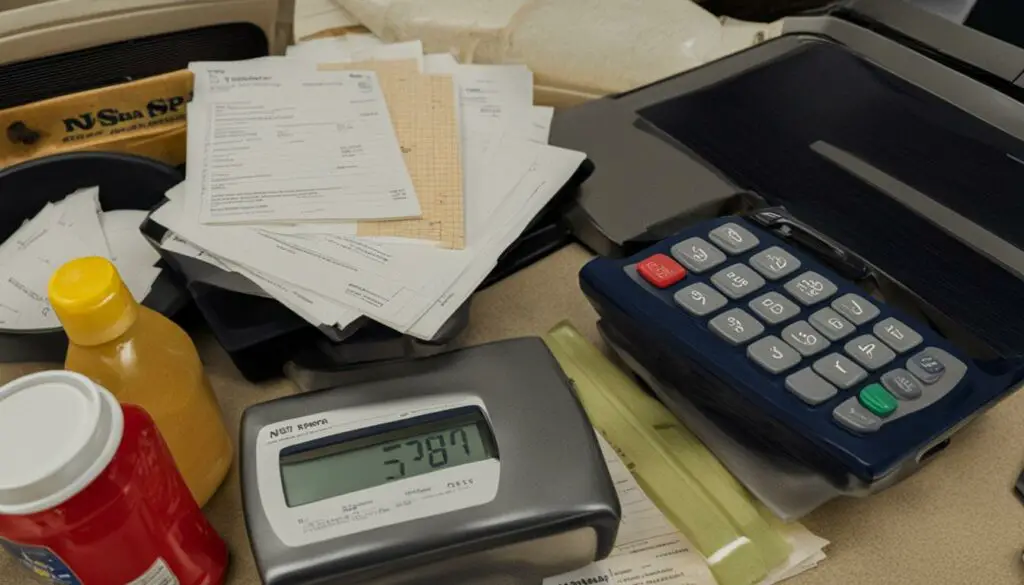Originally posted on December 14, 2023 @ 8:47 pm
In New Jersey, the amount of food stamps you will receive depends on several factors, including your household income, size, and eligibility. The gross monthly income eligibility standards for SNAP in New Jersey are set at 185% of the Federal Poverty Level (FPL). However, households that include a senior or people with disabilities may still be eligible even if their income exceeds these limits. The state also has a minimum monthly SNAP benefit of $95, which means if you qualify for a lower amount, New Jersey will add a supplemental payment to ensure you receive at least $95 in benefits.
Table of Contents
Key Takeaways:
- The amount of food stamps you receive in New Jersey depends on factors such as income, household size, and eligibility.
- Income eligibility is set at 185% of the Federal Poverty Level (FPL), but exceptions apply for seniors and individuals with disabilities.
- New Jersey has a minimum monthly SNAP benefit of $95.
- If you qualify for a lower amount, New Jersey will provide a supplemental payment to ensure you receive at least $95 in benefits.
- Calculating your specific benefit amount can be done using the NJ SNAP benefits calculator.
Income Eligibility for NJ SNAP
To be eligible for SNAP benefits in New Jersey, your household must meet the maximum allowable income limits based on your household size. The income limits are calculated at 185% of the Federal Poverty Level (FPL). The maximum allowable income for different household sizes can be found in the eligibility standards. It’s important to note that meeting the income requirements does not automatically guarantee eligibility for SNAP. Other factors such as household composition, expenses, and resources are also taken into consideration.
Calculating and determining income eligibility for NJ SNAP involves an evaluation of your gross monthly income, deductions, and expenses. These factors help determine whether you qualify for benefits and the amount you may receive. Let’s take a closer look at how income eligibility is determined and what guidelines you need to meet.
Determination Factors for Income Eligibility:
- Gross Monthly Income: The first step is to assess your household’s gross monthly income. This includes all sources of income before taxes and deductions. Examples of income sources include wages, self-employment income, Social Security benefits, and unemployment benefits.
- Household Size: The size of your household determines the income limit you must meet to be eligible for SNAP. New Jersey uses a set of guidelines that establish the maximum allowable income for households of different sizes. The guidelines are based on the federal poverty level and are adjusted annually.
- Net Income Restrictions: After calculating your gross monthly income, certain deductions are applied to determine your net monthly income. These deductions may include shelter costs, dependent care expenses, medical expenses for elderly or disabled members, and child support payments.
- Resources and Assets: In addition to income, the value of your resources and assets may also affect your eligibility. Resources include bank accounts, cash on hand, vehicles, and property. New Jersey sets specific limits on the value of countable resources that a household can have and still be eligible for SNAP benefits.
By considering these factors, the NJ SNAP program ensures that benefits are directed to those who need them most. It takes into account both income and non-income factors when assessing eligibility and benefit amounts. The goal is to provide assistance to individuals and households facing challenges in meeting their basic food needs.
To better understand income eligibility for NJ SNAP, refer to the table below:
| Household Size | Maximum Gross Monthly Income Limit (185% FPL) |
|---|---|
| 1 | $2,128 |
| 2 | $2,874 |
| 3 | $3,620 |
| 4 | $4,366 |
| 5 | $5,112 |
| 6 | $5,858 |
| 7 | $6,604 |
| 8 | $7,350 |
Example Scenario:
John and Jane have a household size of 4. Their gross monthly income is $4,500. Let’s determine if they meet the income eligibility criteria.
Step 1: John and Jane’s gross monthly income falls within the maximum allowable limit for a household size of 4, which is $4,366.
Step 2: After calculating deductions such as shelter costs and dependent care expenses, their net monthly income is determined.
Step 3: If their net monthly income is below the maximum allowable limit for a household size of 4, they would meet the income eligibility criteria for NJ SNAP.
In this example, John and Jane would be eligible for NJ SNAP benefits based on their income and household size.
It’s important to note that income eligibility is just one aspect of determining your eligibility for NJ SNAP benefits. Other factors, such as household composition and resources, also play a role. The NJ SNAP program aims to provide assistance to individuals and families who are in need of food support. By understanding the income eligibility guidelines and evaluating your circumstances, you can determine if you qualify for NJ SNAP benefits and the amount you may receive.
Special Eligibility Categories for NJ SNAP

In addition to the general eligibility requirements, the NJ SNAP program offers special eligibility categories for specific groups of individuals in New Jersey. This ensures that those who fall under these categories receive the support they need. Let’s take a closer look at these special eligibility categories:
Seniors and Individuals with Disabilities
Seniors aged 60 and older, as well as individuals with disabilities, have different eligibility criteria for NJ SNAP benefits. These individuals may have higher resource limits and longer certification periods. Additionally, medical expenses can be deducted from their income, which can increase their eligibility for SNAP benefits.
College Students
College students may also be eligible for NJ SNAP if they meet certain requirements. To qualify, students must be enrolled in an approved program, participate in work-study, or have responsibility for a dependent. Meeting these specific criteria can help college students access vital food assistance through the NJ SNAP program.
By offering these special eligibility categories, NJ SNAP ensures that vulnerable populations such as seniors, individuals with disabilities, and college students receive the support they need to meet their nutritional needs. These categories take into account the unique circumstances of each group and provide tailored assistance to ensure their well-being.
| Special Eligibility Categories | Criteria |
|---|---|
| Seniors and Individuals with Disabilities | Different eligibility criteria for seniors and individuals with disabilities, including higher resource limits, longer certification periods, and deductions for medical expenses. |
| College Students | Enrollment in an approved program, participation in work-study, or responsibility for a dependent. |
Emergency SNAP Benefits during Public Health Crisis

During a public health crisis, such as the COVID-19 pandemic, New Jersey offers emergency supplemental food assistance benefits to eligible households. These emergency benefits aim to ensure that households receive the necessary support during challenging times.
In New Jersey, eligible households are provided with additional benefits to supplement their regular monthly SNAP benefits. These emergency benefits are available as long as the federal public health state of emergency remains in place.
To determine the amount of emergency benefits a household is eligible for, New Jersey follows specific guidelines. In general, households receive either a minimum of $95 in additional benefits or the maximum temporary benefit amount for their household size, whichever is greater.
The emergency SNAP benefits in New Jersey provide essential support to families and individuals, ensuring they have access to nutritious food during times of crisis. This assistance helps alleviate some of the challenges faced by household members, especially when regular SNAP benefits might not be sufficient.
It is important to note that eligibility for emergency benefits is based on the household’s existing SNAP benefits. Eligible households receive these emergency benefits when their regular SNAP benefits are available.
Emergency SNAP Benefits Eligibility Criteria:
The following criteria determine the eligibility for emergency SNAP benefits during a public health crisis:
- Households that are already enrolled in the NJ SNAP program
- Households receiving SNAP benefits that are below the threshold for their household size
- Households receiving the minimum monthly SNAP benefit amount
It is important for eligible households to stay informed about emergency benefit distributions and any updates from the New Jersey SNAP program. These benefits serve as a lifeline for families and individuals during challenging times, providing them with the much-needed support to meet their nutritional needs.
How to Apply for NJ SNAP

When you’re ready to apply for NJ SNAP benefits, the process is straightforward and can be done through various methods to accommodate your preference and convenience:
- Online Application: Visit the MyNJHelps website, where you can complete the application online. This option provides a convenient way to submit your information from the comfort of your own home.
- Paper Application: If you prefer a physical application, you can request a paper copy to be mailed to you. Simply provide your contact information, and the application will be sent to your designated address.
- Phone Application: For those who prefer assistance over the phone, you can complete the application process by calling the SNAP office. A representative will guide you through the necessary steps and help you provide all relevant details.
- In-Person Application: If you prefer a face-to-face interaction, you have the option to apply in person at your local County SNAP office. The staff will assist you with the application process and address any questions or concerns you may have.
Regardless of the application method you choose, you will need to provide information about your household, income, expenses, and other relevant details. This ensures that the NJ SNAP program can accurately evaluate your eligibility and determine the appropriate level of benefits for your situation.
It’s important to note that interviews are not required for most households, and the processing time for your application is typically within 30 days. During this period, the SNAP agency will review your application, verify the provided information, and make a determination regarding your eligibility for NJ SNAP benefits.
Ensuring that all information is accurate and complete can help expedite the processing of your application. If additional documentation or clarification is needed, you may be contacted by the SNAP agency.
“Applying for NJ SNAP Benefits is Quick and Easy!” – John Smith, NJ SNAP Beneficiary
“Applying for NJ SNAP benefits was surprisingly straightforward. I filled out the online application and was able to provide all the necessary information without any complications. Within a few weeks, I received a notification that my application was approved, and I started receiving the much-needed assistance. The application process was hassle-free, and I would encourage anyone who needs help to give it a try.”
| Application Method | Process |
|---|---|
| Online Application | Complete the application on the MyNJHelps website |
| Paper Application | Request a physical application to be mailed to you |
| Phone Application | Complete the application process over the phone |
| In-Person Application | Apply in person at your local County SNAP office |
Eligibility Screening for NJ SNAP

If you want to quickly find out if you may be eligible for NJ SNAP benefits, you can use the eligibility screening tool available on the New Jersey SNAP website. The screening process takes approximately five minutes and will provide you with information on your potential eligibility for food assistance, cash assistance, and other programs. This tool can help you determine if it is worth proceeding with the full application process.
To access the eligibility screening tool, visit the New Jersey SNAP website and look for the “Eligibility Screening” section. Click on the provided link to access the tool. Once there, you will be guided through a series of questions to gather information about your household size, income, and other relevant factors. Make sure to answer the questions accurately and honestly for the most accurate results.
After completing the eligibility screening tool, you will receive a summary of your potential eligibility for NJ SNAP benefits. This summary will indicate whether you may qualify for assistance and provide information on the next steps to take. If you are deemed eligible, it is recommended to proceed with the full application process to apply for NJ SNAP benefits.
Why Use the Eligibility Screening Tool?
Using the eligibility screening tool can save you time and effort. Instead of completing a full application only to find out later that you may not be eligible, the screening tool gives you an initial assessment of your eligibility status. It allows you to make an informed decision on whether to continue with the application process or explore other options.
The eligibility screening tool is designed to provide you with a general indication of eligibility based on the information you provide. However, it is important to note that the final determination of eligibility will be made by the NJ SNAP program based on a comprehensive review of your application and supporting documentation.
Remember, even if the eligibility screening tool indicates that you may be eligible for NJ SNAP benefits, it is still important to complete the full application process to ensure that you receive the correct benefits. The application process requires providing detailed information about your household, income, expenses, and other relevant details. If you have any questions or need assistance with the application, refer to the resources provided on the New Jersey SNAP website or contact the County SNAP office for guidance.
Outreach and Assistance for NJ SNAP

The NJ SNAP program understands the importance of reaching out to and assisting individuals who may be eligible for benefits. Through collaboration with local agencies, such as the Community FoodBank of New Jersey, Fulfill, and Food Bank of South Jersey, the program strives to increase awareness about SNAP availability, eligibility requirements, application procedures, and the benefits of participating in the program. These agencies play a crucial role in providing valuable information, answering queries, and supporting applicants throughout the application process.
If you are considering applying for NJ SNAP, it is essential to be cautious of potential scams and seek assistance only from authorized outreach representatives. These reputable agencies are well-equipped to address your concerns and guide you through the application requirements, ensuring you navigate the process smoothly.
Remember, authorized outreach representatives from trusted agencies, including the Community FoodBank of New Jersey, Fulfill, and Food Bank of South Jersey, can provide the assistance you need to understand the NJ SNAP application requirements and apply successfully.
Benefits of Outreach and Assistance
Engaging with outreach agencies can provide several benefits, including:
- Increased awareness: These agencies actively work to raise awareness about the NJ SNAP program, ensuring that individuals who may be eligible for benefits are informed about the available resources.
- Guidance and support: Authorized representatives can provide personalized assistance, answering questions and clarifying any doubts you may have about the application process, eligibility criteria, and benefit calculation.
- Application assistance: Outreach agencies can guide you through the entire application process, helping you gather the necessary documentation and complete the required forms accurately.
- Access to resources: These agencies often have a wealth of resources beyond just SNAP, providing access to other support programs and services that can further assist individuals and families in need.
By leveraging the expertise and support of outreach agencies partnered with NJ SNAP, applicants can navigate the application process with confidence, ensuring they receive the benefits they are eligible for.
| Authorized Outreach Agencies for NJ SNAP Assistance | Contact Information |
|---|---|
| Community FoodBank of New Jersey | Website: cfbnj.org |
| Fulfill | Website: fulfillnj.org |
| Food Bank of South Jersey | Website: foodbanksj.org |
Reach out to these authorized agencies for reliable assistance, ensuring that you have access to accurate information and support throughout the NJ SNAP application process.
SNAP Benefit Allotments and Calculation
In New Jersey, the amount of SNAP benefits you receive is determined by factors such as your household size, income, and deductions. Benefit allotments are adjusted annually to reflect changes in the cost of living. As of March 2023, all eligible households receive a minimum of $95 per month in benefits, ensuring a baseline level of assistance for those in need.
The maximum monthly SNAP allotments for different household sizes can be found in the benefit amounts chart below:
SNAP Benefit Amounts for Different Household Sizes:
| Household Size | Maximum Monthly Benefit Allotment |
|---|---|
| 1 | $234 |
| 2 | $430 |
| 3 | $616 |
| 4 | $782 |
| 5 | $929 |
The calculation of SNAP benefits takes into account various factors, including gross income, allowable deductions, and the specific needs of the household. Deductions may be allowed for expenses such as shelter costs, medical expenses, and dependent care expenses. These deductions help adjust the benefit amount to more accurately reflect the household’s available income for purchasing food.
It’s important to note that SNAP benefits are intended to supplement a household’s food budget and may not cover all food expenses. It is essential to carefully plan and budget to ensure that SNAP benefits are used judiciously to meet your household’s nutritional needs.
Rights and Appeals for NJ SNAP
If you believe that your NJ SNAP application has been wrongly denied or that you have not received the correct amount of benefits, you have the right to appeal the decision. You can request a fair hearing to challenge the decision made by the SNAP agency. Legal Services of New Jersey (LSNJ) provides assistance and information on the appeal process. It’s important to contact the appropriate office and provide all necessary documentation to support your case.
Key Steps in the Appeal Process
- Contact the SNAP Agency: Reach out to your local SNAP office or caseworker to let them know that you want to appeal the decision regarding your benefits. They will guide you through the process and provide you with the necessary forms and instructions.
- Complete the Appeal Form: Fill out the appeal form provided by the SNAP agency. Be sure to include all relevant information, such as your case number, the reasons for your appeal, and any supporting documentation.
- Submit the Appeal Form: Submit the completed appeal form to the appropriate SNAP office within the specified deadline. Keep a copy of the form for your records, including any proof of submission.
- Prepare for the Fair Hearing: Once your appeal form is submitted, you will receive notice of your fair hearing date. Take this time to gather any additional evidence or documentation that supports your case. This may include pay stubs, bills, medical records, or any other relevant information.
- Attend the Fair Hearing: On the scheduled date, attend the fair hearing where you will have the opportunity to present your case. Be prepared to provide clear and concise statements, backed by evidence, to support your appeal.
- Receive the Decision: Following the fair hearing, you will receive a written decision regarding your appeal. This decision will outline whether your benefits will be granted, adjusted, or denied.
Legal Services of New Jersey (LSNJ)
Legal Services of New Jersey (LSNJ) is a non-profit organization that provides free legal assistance to low-income individuals and families. LSNJ can help you understand the appeal process, provide guidance on your rights, and offer legal representation if needed. Their experienced attorneys are dedicated to ensuring that your voice is heard and your rights are protected. Contact LSNJ to learn more about how they can assist you in navigating the NJ SNAP appeals process.
Conclusion
The NJ SNAP program serves as a valuable resource for individuals and families with low incomes, providing crucial assistance in purchasing nutritious food. Your eligibility for benefits and the amount you receive is determined by factors such as household size, income, and adherence to program guidelines.
By understanding the nj food stamp guidelines, completing the application process, and accurately calculating benefit amounts, you can assess your eligibility for NJ SNAP benefits. Regularly reviewing program guidelines and promptly reporting any changes in your circumstances will help ensure that your benefits remain accurate and up to date.
Remember, NJ SNAP is designed to support those in need, and the program is committed to improving the lives of individuals and families in the state. If you believe your application was wrongfully denied or if you have concerns about the amount of benefits you receive, you have the right to appeal. Seek assistance from organizations such as Legal Services of New Jersey to guide you through the appeals process.
FAQ
How much food stamps will I get in New Jersey?
The amount of food stamps you will receive in New Jersey depends on factors such as your household income, size, and eligibility. The benefit amount is calculated based on the maximum allowable income limits and household composition. Specific allotments can be found in the benefit amount chart.
What are the income eligibility guidelines for NJ SNAP?
The income eligibility standards for NJ SNAP are set at 185% of the Federal Poverty Level (FPL). However, households that include seniors or people with disabilities may still be eligible even if their income exceeds these limits. The maximum allowable income for different household sizes can be found in the eligibility standards.
Are there special eligibility categories for NJ SNAP?
Yes, certain special eligibility categories exist for specific groups in New Jersey. Seniors aged 60 and older, individuals with disabilities, and college students may have different eligibility criteria, resource limits, and deductions. Criteria such as enrollment in an approved program or work-study participation are considered for college students.
Do emergency SNAP benefits exist in New Jersey?
Yes, during a public health crisis like the COVID-19 pandemic, New Jersey provides emergency supplemental food assistance benefits to eligible households. These emergency benefits ensure that households receive at least $95 in additional benefits or the maximum temporary benefit amount, whichever is greater. Eligible households receive these benefits when their regular SNAP benefits are available.
How do I apply for NJ SNAP?
To apply for NJ SNAP, you can complete an online application on the MyNJHelps website or request a paper application by mail. The application process requires providing information about your household, income, expenses, and other relevant details. You may also apply in person at the County SNAP office. Interviews are not required for most households, and the application will be processed within 30 days.
Is there an eligibility screening tool for NJ SNAP?
Yes, you can use the eligibility screening tool available on the New Jersey SNAP website to quickly determine if you may be eligible for food assistance. The screening process takes about five minutes and provides information on potential eligibility for food assistance, cash assistance, and other programs. This tool can help you decide if it is worth proceeding with the full application process.
Are there outreach and assistance programs for NJ SNAP?
Yes, the NJ SNAP program works with local agencies such as the Community FoodBank of New Jersey, Fulfill, and Food Bank of South Jersey to provide outreach and assistance. These agencies increase awareness about SNAP, eligibility requirements, application procedures, and program benefits. They can provide information, answer questions, and assist with the application process.
How are SNAP benefits calculated in New Jersey?
The amount of SNAP benefits you receive in New Jersey is based on factors such as household size, income, and deductions. Benefit allotments are adjusted annually, and as of March 2023, all eligible households receive a minimum of $95 per month in benefits. The calculation takes into account gross income, allowable deductions, and specific needs of the household.
What are my rights and options for appeals in NJ SNAP?
If you believe your NJ SNAP application has been wrongly denied or you have not received the correct amount of benefits, you have the right to appeal. You can request a fair hearing to challenge the decision made by the SNAP agency. Legal Services of New Jersey (LSNJ) provides assistance and information on the appeal process.
How can I ensure my NJ SNAP benefits are accurate and up to date?
It’s important to regularly review the program guidelines and report any changes in circumstances to ensure your NJ SNAP benefits are accurate and up to date. This includes changes in income, household composition, expenses, and resources. Keeping your information current will help ensure you receive the appropriate amount of benefits.
Source Links
- https://www.nj.gov/humanservices/njsnap/about/njsnap/
- https://www.nj.gov/humanservices/njsnap/apply/eligibility
- https://www.lsnjlaw.org/legal-topics/government-aid-services/food-hunger-nutrition/food-stamps/pages/snap-nj-food-stamp-program-aspx
See also:
Leave a Reply